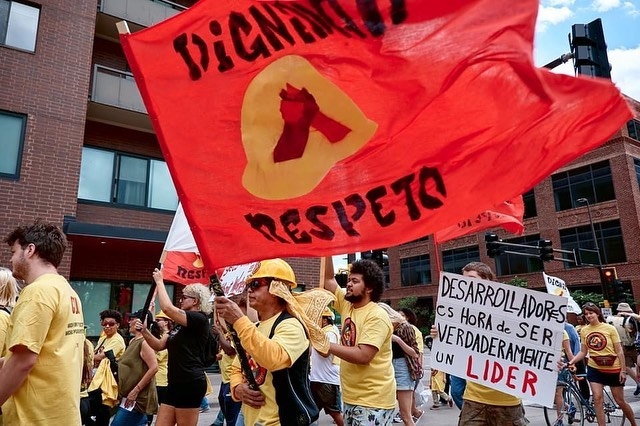
Workers Confluence 2024 Grantees, and Our Commitment to Trust-Based Philanthropy
March 6th, 2024For the third year in a row, Workers Confluence Fund of Minnesota is awarding $50,000 to $75,000 grants to six community organizations, each of which is partnering with one or more labor unions to build power for workers at the margins of the economy.
These partnerships logged an astonishing array of victories over the past year, including successfully advocating for new pro-worker policies at the state level, launching a Minneapolis Strippers Guild which will soon be making health insurance available to its members, and setting the stage for the 200+ workers of First Avenue Productions to achieve their groundbreaking union victory.
Funded partnerships:
- Awood Center, partnering with Teamsters Local 120 on outreach and organizing of (primarily East African) Amazon warehouse workers.
- Centro de Trabajadores Unidos en la Lucha (CTUL), partnering with Minneapolis Building and Construction Trades Council as well as the regional councils of the Carpenters and Laborers unions to raise labor standards for non-union construction workers.
- Kids Count on Us (a project of ISAIAH), partnering with Education Minnesota to bring the voices of childcare workers into the coalition campaign for robustly-funded, universal childcare in Minnesota.
- New Justice Project, partnering with Minneapolis Building and Construction Trades Council and Teamsters Local 120 to build new pathways into union careers for Black workers, with a focus on formerly incarcerated workers.
- Restaurant Opportunities Center of Minnesota (ROC), partnering with UNITE HERE Local 17 on organizing and leadership development of Twin Cities restaurant workers.
- Sex Worker Outreach Project of Minnesota (SWOP), partnering with UNITE HERE Local 17 to organize Minneapolis strippers through a guild model.
Workers Confluence favors multi-year, general operations support for our grantees. We conduct annual reporting interviews in order to assure that both partners are still committed to the project, and to identify capacity-building/technical assistance needs. But we don’t require lengthy reporting or measure our grantees’ progress against a rigid set of deliverables.
As debate swirls around the efficacy of trust-based philanthropy, we are confidently continuing our trust-based approach to supporting innovative worker power-building collaborations. The three truths that got us here:
- Building deeply trusting relationships is a crucial first step in fruitful union/community collaborations. Deep trust is “a firm belief in the reliability, integrity, and discernment of those one works with; this cultivates the ability to tackle complex issues together.” Confluence staff facilitates relationship-building sessions to help newer partners begin to connect, and with our funding choices we seek to build in the spaciousness for deep trust to develop. We also recognize that we must build relationships of deep trust between Confluence staff and our grantees and labor partners. This makes possible the level of candor that allows us to understand the inner workings of these partnerships so that we can intervene with additional forms of support when needed, as well as draw out the lessons that can benefit other partnerships within our ecosystem.
- There are many paths up the mountain. There is no one-size-fits-all blueprint for successful worker power-building partnerships between unions and community organizations. Some of the partnerships we support are engaged in fully-established, joint projects. Others are deeply aligned, but rather than a joint project, they share information and work in parallel to amplify each other’s impact. Others are at the stage of exploring and experimenting, zeroing in on how they can work together most effectively. What is possible for a given partnership varies enormously based on factors including industry conditions, community needs, and how central the project is to both partner organizations’ key priorities. Through our annual reporting interviews and our ongoing on-the-ground engagement with our supported groups, Workers Confluence is identifying best practices for effective partnerships. But we will maintain a light touch in this regard, because forcing these partnerships into a rigid framework runs the risk of stifling the very innovations we are seeking to nurture.
- BIPOC-led organizations are chronically under-resourced. Workers Confluence prioritizes funding organizations that are operated by and for those most directly impacted by economic injustice. But it is estimated that only 8% of philanthropic dollars goes to BIPOC-led nonprofits, and white-led nonprofits are thought to be twice as likely to receive unrestricted grant dollars versus BIPOC-led organizations. Grassroots organizations led by women, immigrants, queer and trans people, and other marginalized groups are similarly under-resourced. This pushes these organizations to stretch their resources impossibly thin, and then they are somehow expected to deliver transformative results in communities undermined by generations of oppression and disinvestment, on a 12-month grant timeline. This is a recipe for failure. Simply put, we won’t know what Confluence partnerships can achieve together unless we commit to the kind of robust, flexible support that allows these organizations to increase their overall capacity, get out of survival mode, and make space to build trust and dream big together with their union partners.
We at Workers Confluence are excited continue to learning from our grantees, walking beside them through successes as well as their setbacks, and developing more and more effective support structures for transformative partnerships between labor and community.
Share